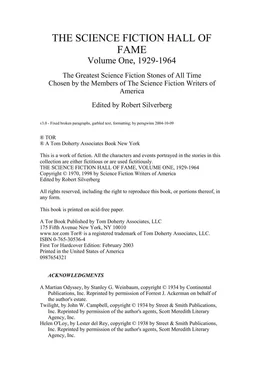Then man reached his full maturity. It extended over a period of a full million years. So tremendously did he stride ahead, the dog ceased to be a companion. Less and less were they wanted. When the million years had passed, and man's decline began, the dog was gone. It had died out.
And now this last dwindling group of men still in the system had no other life form to make its successor. Always before when one civilization toppled, on its ashes rose a new one. Now there was but one civilization, and all other races, even other species, were gone save in the plants. And man was too far along in his old age to bring intelligence and mobility from the plants. Perhaps he could have in his prime.
Other worlds were flooded with man during that million years—the million years.
Every planet and every moon of the system had its quota of men. Now only the planets had their populations, the moons had been deserted. Pluto had been left before I landed, and men were corning from Neptune, moving in toward the Sun, and the home planet, while I was there. Strangely quiet men, viewing, most of them, for the first time, the planet that had given their race life.
But as I stepped from that ship and watched it rise away from me, I saw why the race of man was dying. I looked back at the faces of those men, and on them I read the answer. There was one single quality gone from the still-great minds—minds far greater than yours or mine. I had to have the help of one of them in solving some of my problems. In space, you know, there are twenty coordinates, ten of which are zero, six of which have fixed values, and the four others represent our changing, familiar dimensions in space-time. That means that integrations must proceed in not double, or triple, or quadruple—but ten integrations.
It would have taken me too long. I would never have solved all the problems I must work out, I could not use their mathematics machines; and mine, of course, were seven million years in the past. But one of those men was interested and helped me.
He did quadruple and quintuple integration, even quadruple integration between varying exponential limits—in his head.
When I asked him to. For the one thing that had made man great had left him. As I looked in their faces and eyes on landing I knew it. They looked at me, interested at this rather unusual-looking stranger—and went on. They had come to see the arrival of a ship. A rare event, you see. But they were merely welcoming me in a friendly fashion. They were not curious! Man had lost the instinct of curiosity.
Oh, not entirely! They wondered at the machines, they wondered at the stars. But they did nothing about it. It was not wholly lost to them yet, but nearly. It was dying.
In the six short months I stayed with them, I learned more than they had learned in the two or even three thousand years they had lived among the machines.
Can you appreciate the crushing hopelessness it brought to me? I, who love science, who see in it, or have seen in it, the salvation, the raising of mankind—to see those wondrous machines, of man's triumphant maturity, forgotten and misunderstood. The wondrous, perfect machines that tended, protected, and cared for those gentle, kindly people who had—forgotten.
They were lost among it. The city was a magnificent ruin to them, a thing that rose stupendous about them. Something not understood, a thing that was of the nature of the world. It was. It had not been made; it simply was. Just as the mountains and the deserts and the waters of the seas.
Do you understand—can you see that the time since those machines were new was longer than the time from our day to the birth of the race? Do we know the legends of our first ancestors? Do we remember their lore of forest and cave? The secret of chipping a flint till it had a sharp-cutting edge? The secret of trailing and killing a saber-toothed tiger without being killed oneself?
They were now in similar straits, though the time had been longer, because the languages had taken a long step towards perfection, and because the machines maintained everything for them through generation after generation.
Why, the entire planet of Pluto had been deserted—yet on Pluto the largest mines of one of their metals were located; the machines still functioned. A perfect unity existed throughout the system. A unified system of perfect machines.
And all those people knew was that to do a certain thing to a certain lever produced certain results. Just as men in the Middle Ages knew that to take a certain material, wood, and place it in contact with other pieces of wood heated red, would cause the wood to disappear, and become heat. They did not understand that wood was being oxidized with the release of the heat of formation of carbon dioxide and water. So those people did not understand the things that fed and clothed and carried them.
I stayed with them there for three days. And then I went to Jacksville. Yawk City, too. That was enormous. It stretched over—well, from well north of where Boston is today to well south of Washington—that was what they called Yawk City.
I never believed that, when he said it, said Jim, interrupting himself. I knew he didn't. If he had I think he'd have bought land somewhere along there and held for a rise in value. I know Jim. He'd have the idea that seven million years was something like seven hundred, and maybe his great-grandchildren would be able to sell it.
Anyway, went on Jim, he said it was all because the cities had spread so. Boston spread south. Washington, north. And Yawk City spread all over. And the cities between grew into them.
And it was all one vast machine. It was perfectly ordered and perfectly neat. They had a transportation system that took me from the North End to the South End in three minutes. I timed it. They had learned to neutralize acceleration.
Then I took one of the great space liners to Neptune. There were still some running. Some people, you see, were coming the other way.
The ship was huge. Mostly it was a freight liner. It floated up from Earth, a great metal cylinder three quarters of a mile long, and a quarter of a mile in diameter.
Outside the atmosphere it began to accelerate. I could see Earth dwindle. I have ridden one of our own liners to Mars, and it took me, in 3048, five days. In half an hour on this liner Earth was just a star, with a smaller, dimmer star near it. In an hour we passed Mars. Eight hours later we landed on Neptune. M'reen was the city. Large as the Yawk City of my day—and no one living there.
The planet was cold and dark—horribly cold. The sun was a tiny, pale disk, heatless and almost lightless. But the city was perfectly comfortable. The air was fresh and cool, moist with the scent of growing blossoms, perfumed with them. And the whole giant metal framework trembled just slightly with the humming, powerful beat of the mighty machines that had made and cared for it.
I learned from records I deciphered, because of my knowledge of the ancient tongue that their tongue was based on, and the tongue of that day when man was dying, that the city was built three million, seven hundred and thirty thousand, one hundred and fifty years after my birth. Not a machine had been touched by the hand of man since that day.
Yet the air was perfect for man. And the warm, rose-silver glow hung in the air here and supplied the only illumination.
I visited some of their other cities where there were men. And there, on the retreating outskirts of man's domain, I first heard the Song of Longings, as I called it.
And another, The Song of Forgotten Memories. Listen:
He sang another of those songs. There's one thing I know, declared Jim. That bewildered note was stronger in his voice, and by that time I guess I pretty well understood his feelings. Because, you have to remem-P«r, I heard it only secondhand from an ordinary man, and Jim had heard lt from an eye-and-ear witness that was not ordinary, and heard it in that organ voice. Anyway, I guess Jim was right when he said: "He wasn't ^y ordinary man." No ordinary man could think of those songs. They Aren't right. When he sang that song, it was full of more of those plain-live minors. I could feel him searching his mind for something he had forgotten, something he desperately wanted to remember—something he knew he should have known—and I felt it eternally elude him. I felt it get further away from him as he sang. I heard that lonely, frantic searcher attempting to recall that thing—that thing that would save him.
Читать дальше












